
Transcription
The Novelist Portent
December 4, 2012
The Essayistic Ponderings of Johnny E. Mahaffey
Volume 1, Number 1
The Conundrum of Human Rights: Criminality and Recidivation Under Pop-Culture Law, Possible Solutions, and the Psychopathological Enrichment of Prisoner Blogs
ABSTRACT
My response to "Blogging for Human Rights Day: Let's Talk about US", could be nothing short of an essay, this I knew immediately - and if you'll forgive me for my pretentious circumlocution (1), I think you'll find what I have to say on this matter of the inside-informative nature, as I discuss both sides of a few issues now being dealt with by the United States criminal justice system.
Crime must be dealt with on its largest stage: society. But a cop on every street corner and in every tree isn't the answer, and half the population in jail or on some form of probation, is not the answer: what's behind crime, driving it psychologically, therein lies the answer that will help in the understanding of what to do. The chips of responsibility may rest upon the criminal's shoulders, but the sawdust from their making is spread throughout the lungs of societal respiration.
This essay will barely scratch the surface of the issues, and I will be following up as a series of essays in the attempt to better cover all of the appropriate issues in a logical manner. The main focus of this essay is to basically open the conversation, welcoming any comments, so that a communication can hopefully be developed that will result in a better situation for those unable to help themselves, those lost within the system.
Many inmates I meet cannot even read or write, and writing is about the most constructive thing an inmate can do. More prisons should take the initiative to help the incarcerated better themselves, writing is a good place to start.
THE RIGHT TRACK
So our world doesn't hyperventilate, we have to go to the mill of criminal behavior to cut the power at its source, one breaker at a time. This is no easy task, nor will it be quickly achieved - "To convert a man, a beast of prey, into a tame and civilized animal, a domestic animal". (Friedrich Nietzsche, Roget's Pg. 107) - it's centuries in the making, after all. More really since we model our law from Roman times. But that doesn't mean we shouldn't try.
And trying, is exactly what some are doing.
Chatham University says that Creative Writing is "all the rage" and poses a rhetorical: "What's in the mind of an inmate? Rage? Regret? Yes. But most of all, hope." (Poets & Writers Nov/Dec 2012 pg. 9)
Visit: chatham.edu/walls
Such ideas are awe-inspiring in the face of pop-culture-socialization, to put monetarian aspirations aside - even for a moment - for any reason, especially something noble like empathy. Humanity sometimes moves slow, it is very weak-in-the-knees when faced with large piles of cold, freshly inked bills stacked in neat piles; but humanity is always underestimated, as time and time again, like the water of oceans, it wins out. Even if it has to remove one grain of sand at a time, it will reshape the world, just as humanity, through one person at a time, will rebuild our understanding of life, and our place in it. "History is philosophy from examples". (Dionysius of Halicarnassus (2))
Cash-flow issues and fiscal panics may scare the masks off of Presidents and Governors alike, c'est la vie. Every human knows they are not on this planet to be nothing more than the next-in-line-Black-Friday-shopper, waiting for Ijunk number 89 or whatever the industry has programmed us into thinking we need, that we don't need, but we must have because Joe Smoe has it. Every problem with the world has one unifying factor: greed. If we could only all break free of it, even if for a moment, to get a minute of clarity in our thought. There's a line in Fight Club that I particularly like: "I'm breaking my attachment to physical power and possessions", Tyler whispered, "because only through destroying myself can I discover the great power of my spirit". (Palahniuk, Pg. 110)
We know what we are doing.
Every single one of us, we play our role grandly. Looking the other way as the world around us burns, in some countries, literally. As if some magick (3) solution is just going to sweep it away, eventually. But there isn't going to be any help, it has to be done the hard way - and that first will mean disillusioning ourselves of everything being as it should be, and that it's going to be all right. It's not all right, the laws and governments are not infallible, in fact, they are corrupted and need rebuilding. If you don't believe me, go fill up the gas tank in your car, maybe even pull out one of those credit cards, and smile for the seven police cars you pass and drone overhead, don't forget the drone.
"I think for my part one half of the nation is mad - and the other not very sound".
- Tobias Smollett (4)
We're in the cusp of an evolutionary leap with our very bipedal attainment endangered by digitized vegetation, teetering on a precipice of new world collaboration, or collapse. We can't afford to be distracted by Ijunk 89, while behind the curtain Big Brother stretches his legs to toddle around in our back yards, pointing his totalitarian pacifier at us in accusation.
"Oh, he's so cuuuuute!" everyone says.
Until we notice, too late, that his pacifier is in fact a chew toy, and that he is the foundling child of old Russia's worst nightmare. He feeds on sand and poops sawdust. If we look the other way, just for a moment: we get a prison in every town and off every highway.
What Chatham University, Between the Bars, and all other similar programs are doing will prove crucial to humanity. Most don't see it now, and some that do see it don't acknowledge it, or care; but the problem remains, and will continue to remain until faced. It rests on the shoulders of those that know, and do care, to fix it - even if that means one person at a time.
Giving inmates an outlet such as Creative Writing via a blog, gives not just a source of emotional healing - through words - but a window for those out in the world wishing to look in and see what may have caused the incarceration. The blog is like a diary, and could prove to be, as a whole, very informing on such things as: Where did something go wrong? Where did this person's parents fail, if that is the case? Where did the individual fail? Where did society fail? And most importantly, what could have been done to avoid the situation leading to their situation? Knowing these things are crucial to understanding, and understanding is crucial to fixing it, reducing the criminality altogether.
THE WRONG TRACK
While you may be sitting there with a mouthful of Kung Pau Chicken, reading this essay, with possible compunctional indifference - I say, good for you. "It is what it is" (5). I wouldn't wish incarceration to anyone. I only ask you to heed the warnings you sense and feel, indicators of Big Brother's growth.
I blog regularly of the "Prison Woes" I endure, and readers respond with understanding, even a certain amount of empathy, for my situation. Unfortunately, though, not all responses reach me. Prison mail is complicated, and blogs are in a gray area of policy. Even though every aspect of the blog-by-mail process is legal by both Federal and State law, there are those that do not like it. Politics and vindictive biases are at play, about what to do. Thankfully the U.S. of A's Constitution does allow inmates to remain human, albeit locked up, but still human and with freedom of speech.
The only access to the world is by mail and phone, both of which are monitored by prison officials - and very well I might add. Inmates have no computers in their cells, no internet, nothing like that. Postal mail is the only option, and every piece of mail is in fact examined, both in and out of the prison. Inmates turn in mail unsealed, so that it may be checked, and all mail coming in is opened before an inmate gets it. This is all for security reasons, and rightfully so. If someone's trying to mail drugs or talk of crimes they plan to commit, or have already committed - the right officials should be dutifully notified.
However, to simply try to shut off the voice of an inmate that's getting attention through his/her words, is not only a breach of the Constitution, but morally incorrect in the bigger scheme of things. Think of how much of the world's religious writing, and literary masterpieces emerged from within prison walls.
For me, this blog is not just an outlet for emotion, but a lifeline I have cast out to my five children. It is through these blogged words that they may get to know me most. Though this blog, they will know always that they were loved, thought of constantly, and that they themselves are in no way to blame for their father's situation. I may not live long enough to ever see them - prison is dangerous - and these words I type on my typewriter to be mailed out for my blog, could be all that's left of me.
There is in me, no rage - only hope.
No bitterness - only pity for those that judge me so wrongly.
People love to hate and blame, it's so much easier than understanding. Every human action can be explained in simple, but eerie, psychological-algorithmic equations. Yet we're continually shocked at our neighbor's odd behavior, and can't wait to cast that first stone.
Wearing the White Flower of a blameless life
Before a thousand peering littlenesses,
In that fierce light which beats upon a throne,
And blackens every blot.
-Alfred, Lord Tennyson
(1802-92) (6)
There are lots of options for writers, inmates or not, to connect with the world, "but one of the most important is through blogging". (Writer's Market, Pg. 173); and there are many money-driven, and non-profit college campus-run blogs such as betweenthebars.org that give many inmates a little more reason to live. Inmates have a right to exist, and in this digital age it includes the right of a digital print, as a human.
There are those who believe that prisoners should be removed not only from society, but life itself - all death-penalty arguments aside - into a state of out-of-sight and out-of-mind, "to be dead is to be non-existent" (7), and it is this non-existence they seek to impose upon inmates dwelling within the walls of confinement, already removed from their family, and life that they once had - and it is this state of non-existence that contradicts the very thought of "human rights".
CRIMINALITY AND RECIDIVATION
Throwing away the key is not an answer to crime, it's just a lazy way to deal with it for now, and leave a much larger problem for the next generation to have to deal with. It seems the norm of the current government model to put off until tomorrow what should've been done yesterday. It's the same line of thinking that tanked our economy, but that's for another essay. As far as this movement to mass-incarceration is concerned - it's an out of control train, runaway right at your front door on its way to derail in your very living room.
I can honestly say - from my point-of-view, inside - the Prison System Express has potential. It could, if guided correctly, stay on track and better criminals before releasing them back into society. First, the business model of a revolving door must be dissolved, prisons cannot be allowed to "profit" a single penny by imprisoned humans. They should have money to operate but not profit, it was never meant to be a business. The moment prisoner sentences become influenced by profit and quota, it becomes a very dangerous situation for every single citizen, and none would be safe. We end up with cops facing quotas to justify their paycheck, quotas that don't necessarily care whether crime rates are down, they need them up: money for the courthouse bills, the jail, the patrol car, the gas and equipment in it, the police helicopter training classes (every department needs at least ten pilots), even the very pad - or electronic device - and its price is on the cop's mind as he considers a ticket, and whether or not someone has even committed a crime.
In my thesaurus, I find some disturbing synonyms for "quota", words like "portion, share, cut, ration, allowance, percentage, lot, part, piece, dole, measure". (Roget's, Pg. 466)
Denial is the easiest choice.
But this needs to change.
It won't change itself. In fact, it'll get worse.
Criminals are treated as heinous and abominable, outcast. How can any good be expected to become of that? "It is easier to know a man in general than to know one man in particular". (Duc de la Rochefoucauld (8))
People must work together, movements start with groups, groups start with individuals. Remaining neutral is effortless, but there the door is left wide open for Big Brother's growth. Why not ask "why"? Why are so many people running our country, our very laws and their enforcement, suddenly popping up in the news every day with scandal and their own sets of criminal charges? What's wrong with this picture? That a judge can send you to prison, just before coming to join you a few years later.
It is the general sociocultural judgment that criminals must suffer some sort of "illness" or lack of mental faculties, and that the prisoner is thus outside society and not a result of societal failure - but this view is flawed greatly. A biogenic perspective factors things such as heredity and chemical imbalances; but there are many other behavioral, cognitive, and sociocultural perspectives at play.
An eclectic point of view makes use of many different perspectives. "For example, biogenic factors may create a predisposition, which is made worse by interpersonal problems, conditioning experiences, or poorly learned coping mechanisms". (Abnormal Psychology, Pg. 67)
One can not point a finger at one wrong, and pass total judgment.
DENIAL OF FAMILY RIGHTS
My eldest daughter often reads my blog - with her mother's permission - making occasional comments as she reads her daddy's typed musings. Her mother, Opal, has even read the blog and posted comments. Many of my other children are very young, but when the day comes that they search for it - their father's words - these very pages you now read, and others - will be there, and maybe in some way that will answer questions I'm sure they'll have. I'd rather be with them in person, but the chances aren't good. Most likely I'll be in here still, or worse, dead.
The prisons - as aforementioned on page four - examine every scrap of paper coming in and out of these walls: every envelope, be it a number ten or a manila, it gets opened and searched.
They can even, legally, be read.
And I'm fine with that. Read it when the law allows. It's not like I'm trying to hide anything. It is posted online, every word. Yet, two letters, in all these years, were deemed "disapproved" that were sent to me via B.T.B. and M.I.T., that were comments on the blog: my daughter asking me a question about her name, her mother, PBS shows, and telling me she loves me, are the usual comments from her. These letters do not, in any way, violate laws or prison policy. Right now there is one more letter held back for review, as I type this, and I believe it is a mere letter from B.T.B. informing me that a post I sent in had been transcribed (scanned and set up) to the blog. Some dangerous stuff I suppose.
If you haven't perused my blog (http://betweenthebars.org/blogs/316/), here is a sample, my most recent as I have been working on this essay, it happens to be another poem for my second to oldest daughter, titled "Michaila":
My baby girl,
In the big world without me.
Can she forgive me,
Having left so soon?
Although
I love her, so much, my
Love to her is a mere word;
Against such an absence....
She'll see this, may have already, and may comment. The comment will be printed by students at M.I.T. that happen to have the heart to care, the printout will be received by the mail room, opened, examined, read, and could be labelled "questionable" and sent to headquarters for review, a process that's allowed to take up to 90 days. I will either get the letter, or it will be denied, sent back to the sender or discarded. For this reason, I have those who write to me regularly, keep logs and copies of everything mailed to me so that when mail goes missing I have a legal record of my Constitutional rights being violated.
Mail is a very serious issue, and it is protected by many Federal and State laws. I find it rather surprising when correctional officers put their jobs - and everything they own - on the line by doing illegal things with the mail. A lawsuit concerning violations in mail handling are serious issues.
I understand the search for contraband. But a poem like "Michaila" deemed questionable? Seriously? That, is dangerous to society? What it is, and I think most will agree, is totalitarianism to deny such a thing. Twice this Fall, Big Brother has snatched away the loving endearments of a daughter in need of her daddy, longing to see him again before it is too late and reaching to talk with him before he is gone.
Read the blog yourself, and you be the judge.
MAHAFFEY'S CONUNDRUMAL COIN
The criminal justice system faces what I call Mahaffey's Conundrumal Coin (9): There is no white side;black side, no light;dark, no good;evil, no real heads;tails - there is only this giant garishly-mix-colored coin rolling along in the Fog (10) with heads on both sides. It can never fall. It can only roll along, for as long as humans exist, because it is like Schrodinger's cat, if you shine a light on it to examine it closely - you choose a side, thus destroying the coin itself in the process. One head of the coin represents the inmate and the inmate's family, while simultaneously the other head of the coin represents the victim(s) of the crime and their family.
Both sides hold value.
They are after all, of the same making, human.
The Conundrumal Coin is what judges roll around in their heads when making decisions. While the law may stipulate certain things, the judge is still a person like everyone else, no more. And he must consider the human equation of every crime. This is why the prosecution avoids, at all costs, allowing the "defendant" to be viewed as a fellow "human" - the goal is to paint a defendant as non-human as possible, raising the chances of a guilty verdict and a harsher sentence. This was done to me, my side was never told, and the facts of the case were held back... there was even jury tampering that swayed jurors towards a guilty verdict, leading to my conviction; and now I am in prison. The Conundrumal Coin was tipped against me.
I still feel it leaning, and fight to balance it.
While I live out "The Divine Comedy", South Carolina edition, not everyone is totally satisfied with that, they want me to stop breathing entirely, or just get locked away into some closet never to be seen or heard from again. They won't be happy until the desired level of "non-existence".
VENUES OF SELF-EXPRESSION
I'm lucky enough to have a platform - a podium, if you will - and feel I have a responsibility to lend my writing craft to expressing all that I can that could help, to any who will listen. And as I sit here with my headphones blasting away a Depeche Mode remix of "In Sympathy" and tap tap tap away at the Brother SX-4000 keys, I am in essence creating what Carl Sagan pondered as a form of a time machine: words. Or, more specifically, words recorded for the future to read. It's an interesting way to think of writing, as a crude form of a time traveling device, in which the writer cannot traverse time himself - but his words certainly can, and with his/her words, part of themselves.
It's been happening since the first stone scratched another.
Each writer and reader playing a part in moving their one grain of sand. Shutting off prisoner words, is like quarantining a desert of knowledge, when it would be much more beneficial to society to read the life experience account, inscribed on each grain.
Writing, blogging, creates a database of experience in its extreme destituteness - when inmates are concerned. And as years, decades, or even a century or more, pass, these records of human woes and experience, rants and poems, could prove useful. Because I am sure that as the years go by, as a whole, these blogs create a much larger picture formed by the subconscious of those cast out of society. The picture itself, could reveal something of society, not yet discovered. Imagine having the diary of every prisoner for the last thousand years, and what kind of psychological research could become of it.
Leonardo said that small rooms concentrate the mind (11), and in the case of many of the prisoner blogs you read, you'll see that's just the case. This essay has emerged from my own life experience and is not the result of armchair pontificating - more like pre-casket jitters. A lot of life truths result from such situations, and it's hard to believe people would overlook such an opportunity to study the human element so closely. A few campus groups and businesses, along with some human rights groups see the potential, but are running into a lot of red tape.
Writing is a quiet, constructive thing for inmates to do, and I can't imagine the reasoning of any Warden not wanting the inmates to sit quietly in his cell, at the little metal desk, writing, and then... mailing it out to be posted, giving the Warden, and all officials the chance to read it before it leaves, and then again later at any time via the blog itself, a permanent record.
It can reveal things they may find relevant to what's going on within the walls of prison, when guardian eyes are not looking.
Then, there is the therapeutic factor to consider. Writing is a very good way for individuals to learn, not just a skill, and how to better communicate, and more about themselves. They can let emotions flow freely, and without biased hindrance. And posted prisoner words are not something encountered by chance, a reader must go to an actual prisoner blog host, to read a "prisoner blog" such as at Betweenthebars.org! It's not like it jumps out of your screen at night and tries to strangle you.
There are much more worse things on the net to worry about.
CONCLUSION
It's all about money, greed, and feeling good - and it's all explainable through psychology. It is factorable, equatable, and even repairable.
Creative Writing, through blogs, books, whatever an inmate can accomplish, can help not just the inmate, but the study of criminality. Certain psychopathic insights can be gained through a prisoner's prose. Then, there is the Constitution, and the human rights of the prisoner to consider. Once one line is crossed, the others become blurred. If new laws are created to self-serve the system, that contradict the Constitution and what "America" stands for, then what will we call this new country of totalitarianism?
We can evolve with technology without regressing in human rights.
NOTES
1. My Oxford (Volume I, Pg. 416), defines circumlocution as: "Expression of meaning indirectly or in more words than necessary...". What could be a more appropriate word to describe my long-winded ponderings than that? And you'd better not comment "pompous"!
2. Dionysius of Halicarnassus F1. 30-7 BC, a Greek historian, resident in Rome from 30 BC. The quote is from Arts rhetorica Ch. 11, sect. 2 (Oxford Dictionary of Quotations, Pg. 283:18).
3. "Magick" is a word I find more appropriate when using in regards to things like witches, Wiccan rituals, etc. While the word "magic" has come to better represent things like card tricks or making a building seem to vanish.
4. Tobias Smollet 1721-71, was a Scottish novelist. The quote is from: The Adventures of Sir Launcelot Greaves (1762) Ch. 6 (Oxford Dictionary of Quotations, Pg. 759:6).
5. This is a prison-slang term used almost hourly with inmates that I have come across in the years of my incarceration: "It is what it is!" Some throw in a variant of: "It be what it be!"
6. Alfred, Lord Tennyson 1809-92, English poet. The quote is of Prince Albert, Idylls of the King 'the Coming of Arthur' (1862 ed.) dedication I.24 (Oxford Dictionary of Quotations, Pg. 793:24).
7. The saying, "to be dead is to be non-existent", is from a Greek philosopher named Socrates 469-399 BC. And the Quote is part of Plato Apology 41C, translated by David Gallop (Oxford Dictionary of Quotations, Pg. 759:23)
8. Duc de la Rochefaucauld 1613-80, a French moralist. The quote is from: Maxims (1678) No. 477 (Oxford Dictionary of Quotations, Pg. 428:9)
9. "Mahaffey's Conundrumal Coin" is something I've just made up in order to sum up in one phrase how I feel of the situation. Not even my great big Shorter Oxford English Dictionary has such a word as "conundrumal" so I hope nobody minds me coining it, pun intended.
10. "Fog" is in caps because I am referring to it in sense of an ethereal entity. "Resembling (a) spirit, impalpable; of unearthly delicacy and refinement." (Oxford Volume I, Pg. 869).
11. I have no idea where I read, or heard, this saying; but I do not doubt its accuracy.
REFERENCES
Abnormal Psychology, 3rd ed. by Dr. Sarah Sifers. Copyright by HarperCollins Publishers 1992, 2006.
Oxford, Shorter Oxford English Dictionary Volume I, A-M. Oxford University Press, Oxford. Sixth Edition, Copyright 2007.
Palahniuk, Chuck. Fight Club, Vintage Books London, Copyright by Chuck Palahniuk 1996. (www.vintage-books.co.uk).
Poets & Writers magazine, November/December 2012. Poets & Writers, Inc. New York, NY. (www.pw.org)
Roget's Super Thesaurus, 3rd ed. Writer's Digest Books, Cincinnati, Ohio. Copyright 2003 by Marc McCutcheon (writersdigestbooks.com).
2012 Writer's Market, 91st ed. Copyright 2011 by F + W Media, Inc. Published by Writer's Digest Books, an imprint of F + W Media, Inc., Cincinnati, Ohio. (writersmarket.com)
Other posts by this author
|
2025 dec 27
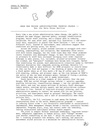
|
2025 dec 3
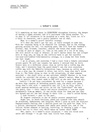
|
2025 nov 30
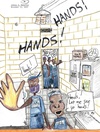
|
2025 oct 26
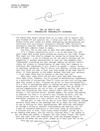
|
2025 oct 9
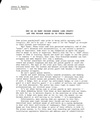
|
2025 oct 8
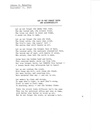
|
More... |
Subscribe
Get notifications when new letters or replies are posted!
| Posts by Johnny E. Mahaffey: |
|
email me |
|---|---|---|
| Comments on “The Conundrum of Human Rights: Criminality and Recidivation Under Pop-Culture Law, Possible Solutions, and the Psychopathological Enrichment of Prisoner Blogs”: |
|
email me |
| Featured posts: |
|
email me |
| All Between the Bars posts: |
|
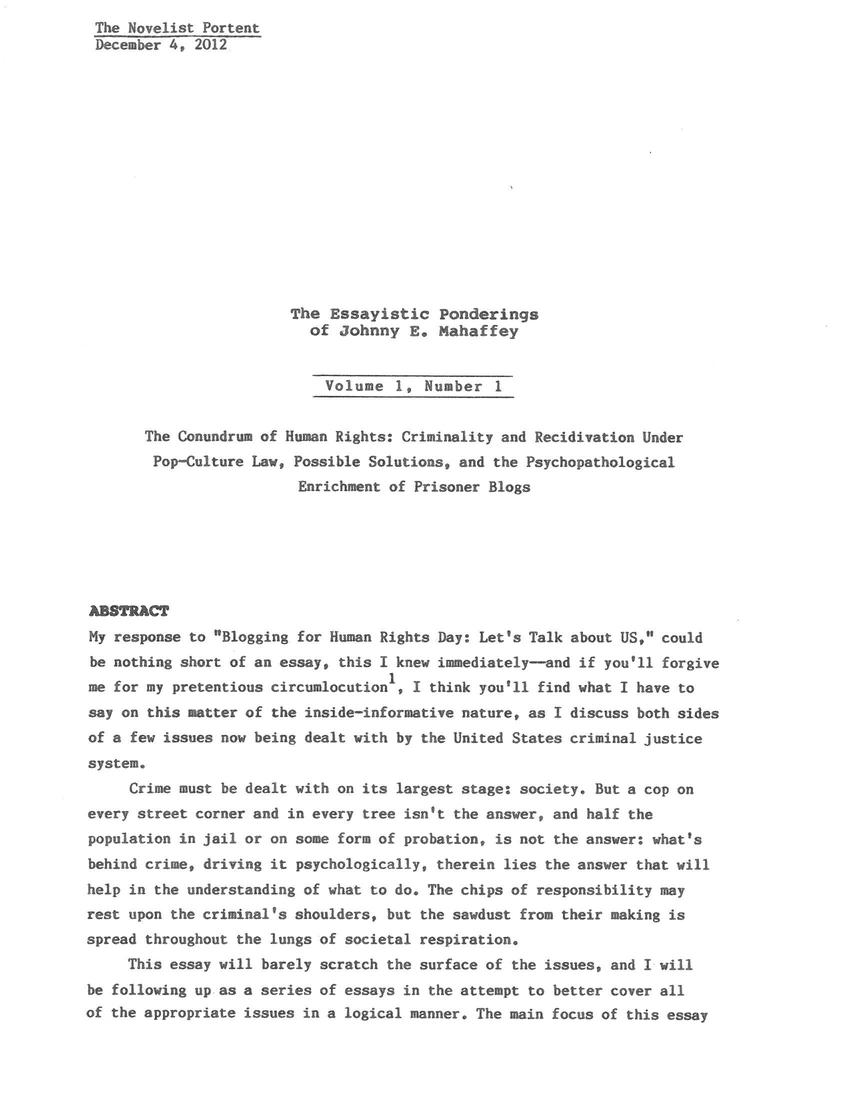
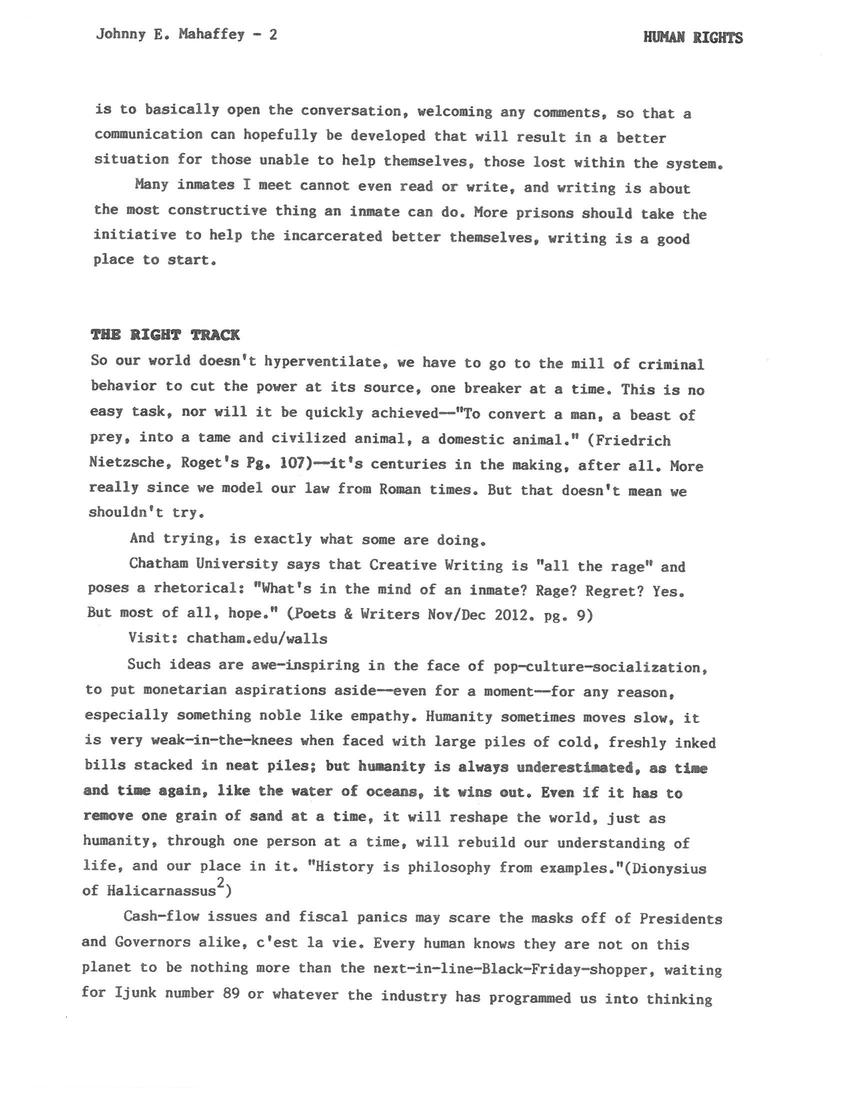
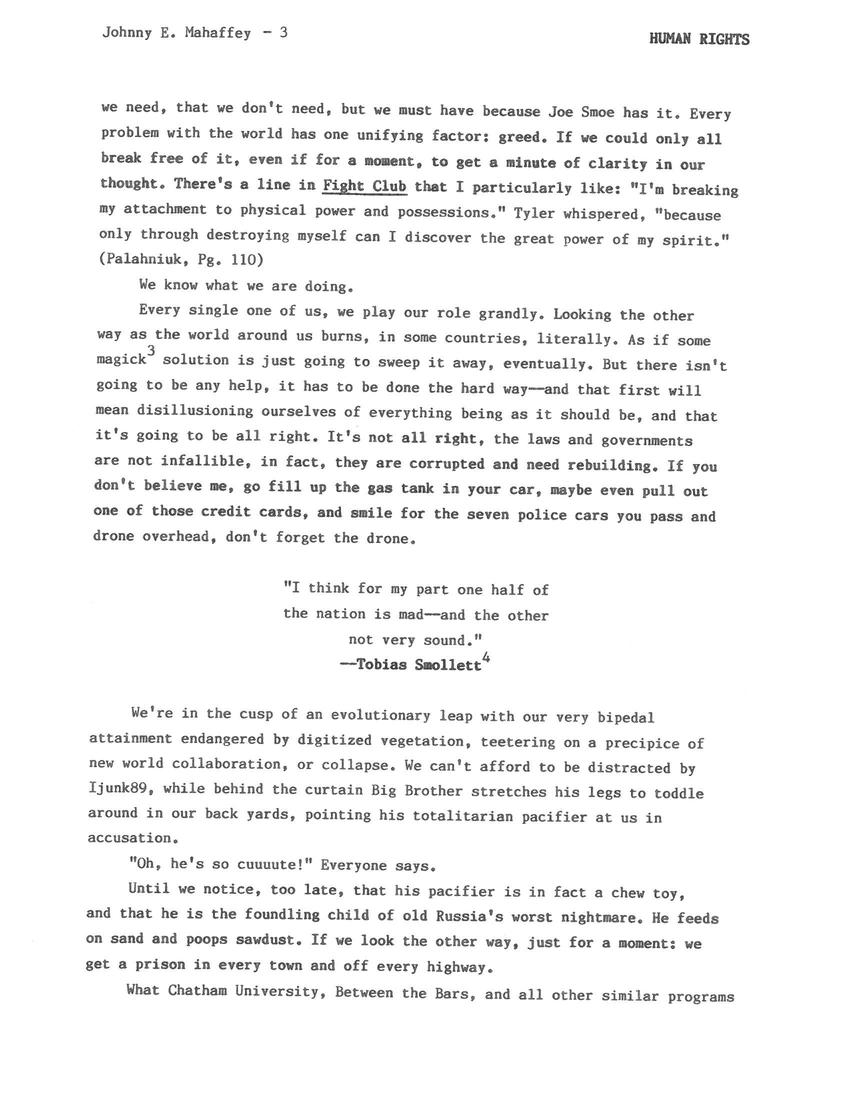
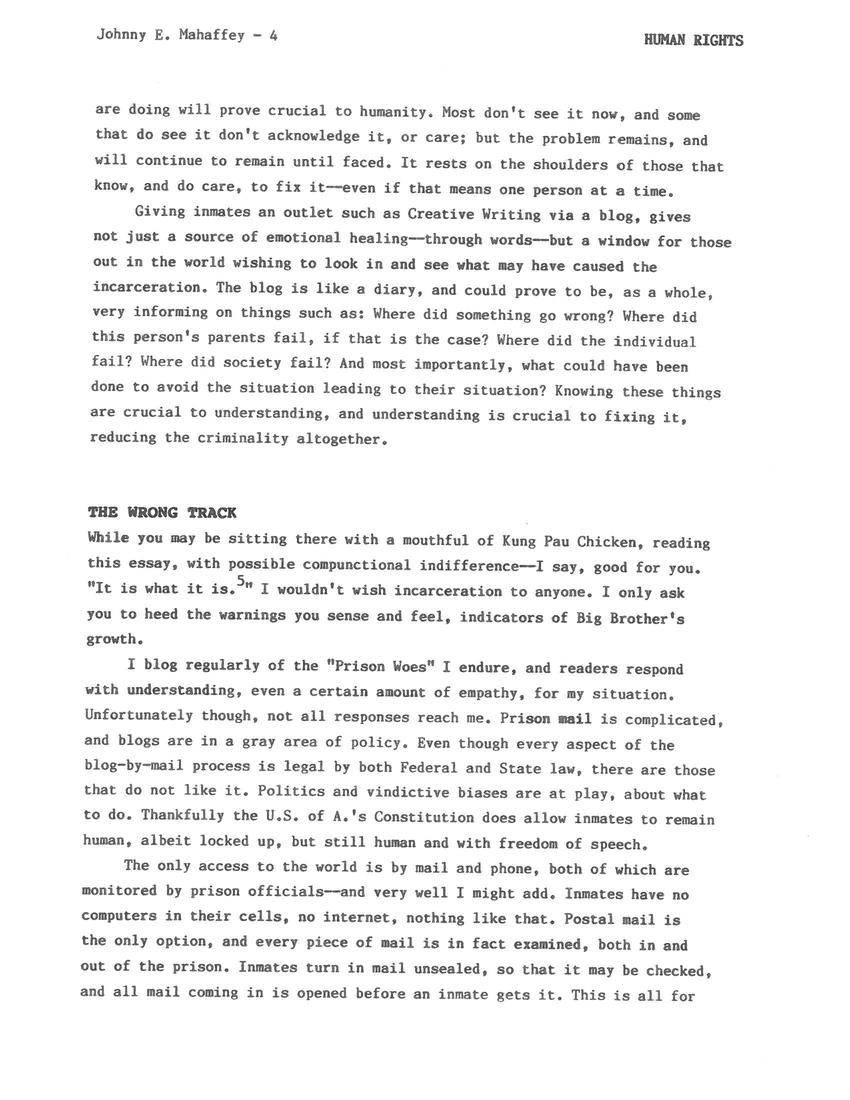
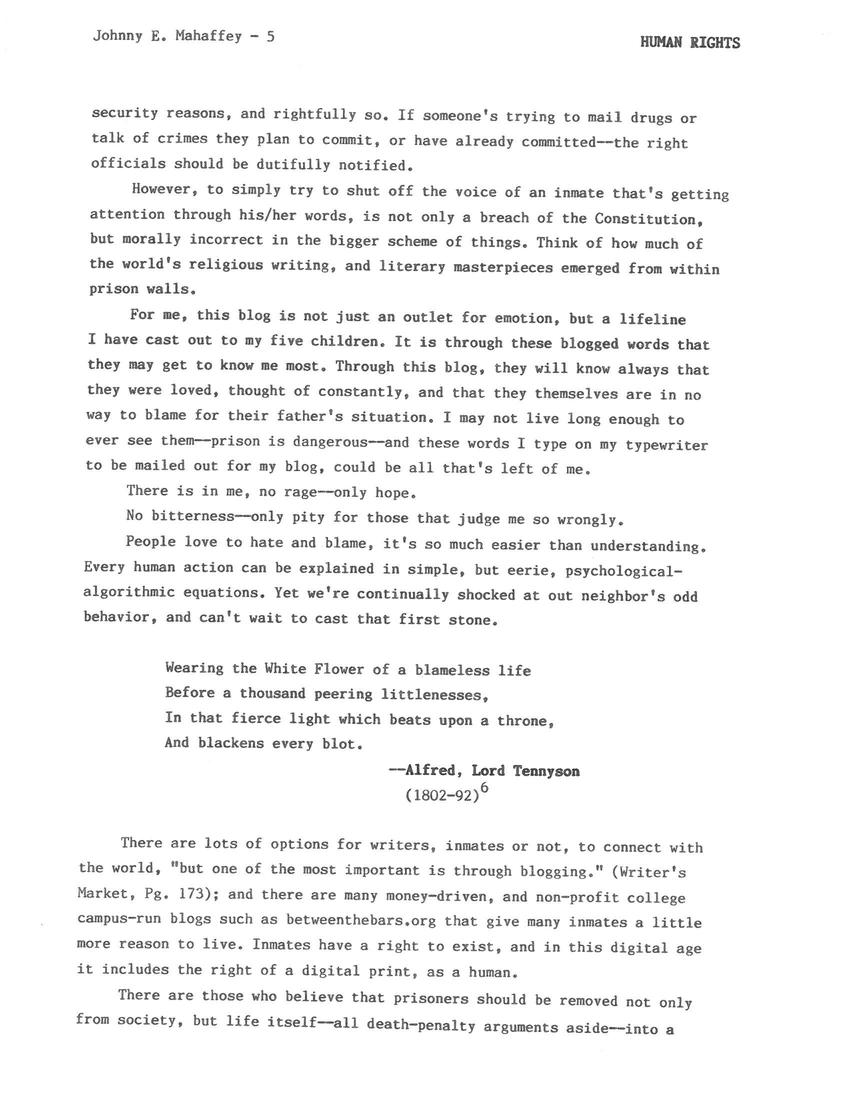
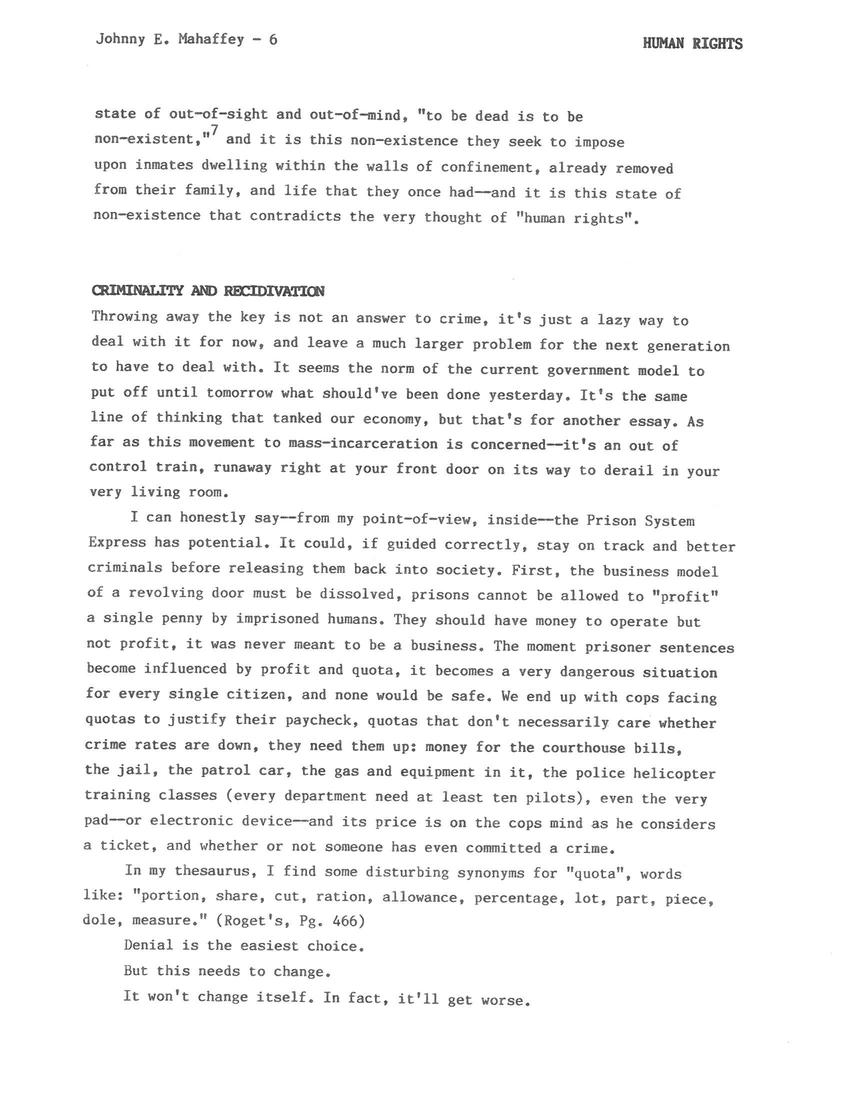
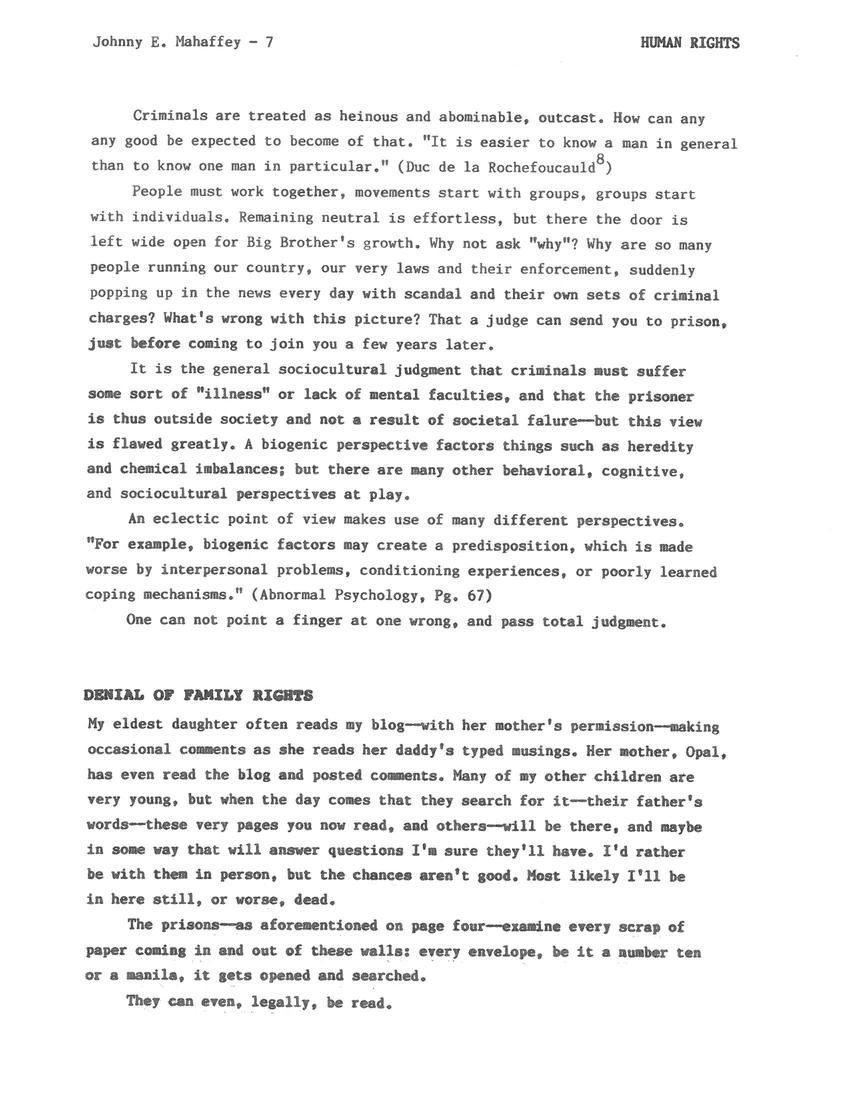
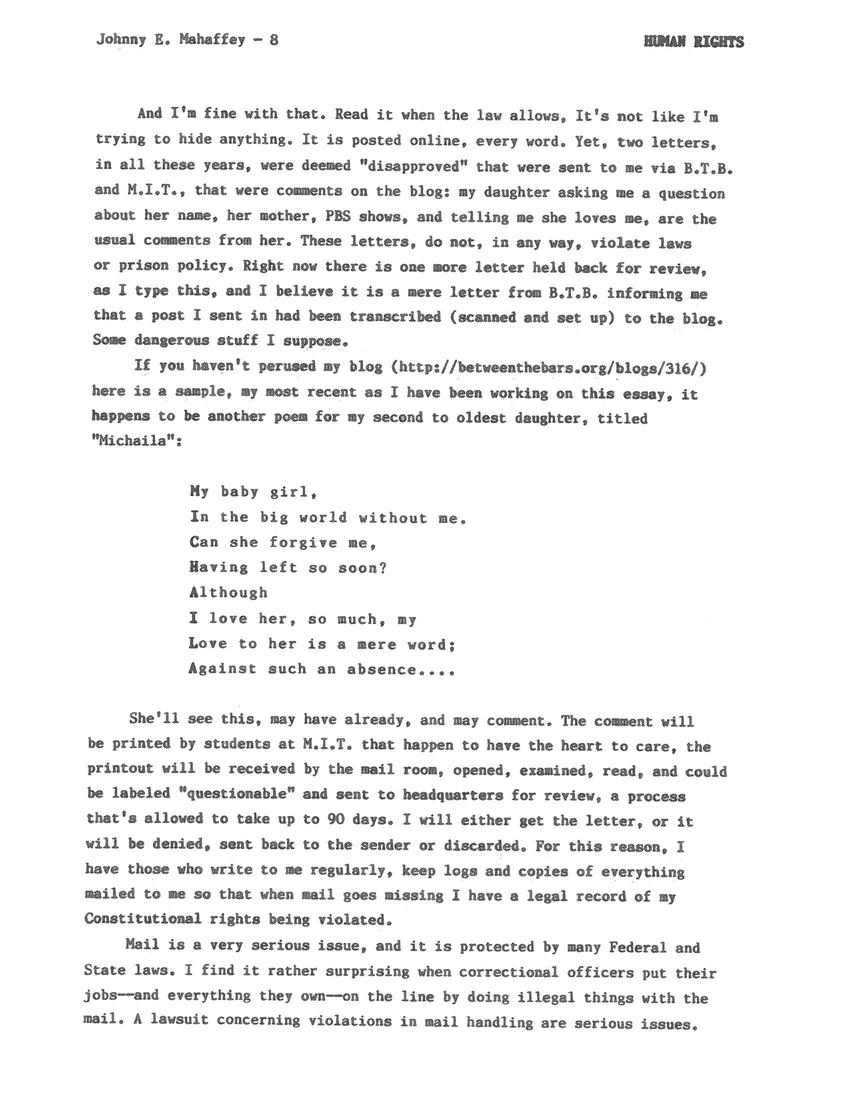
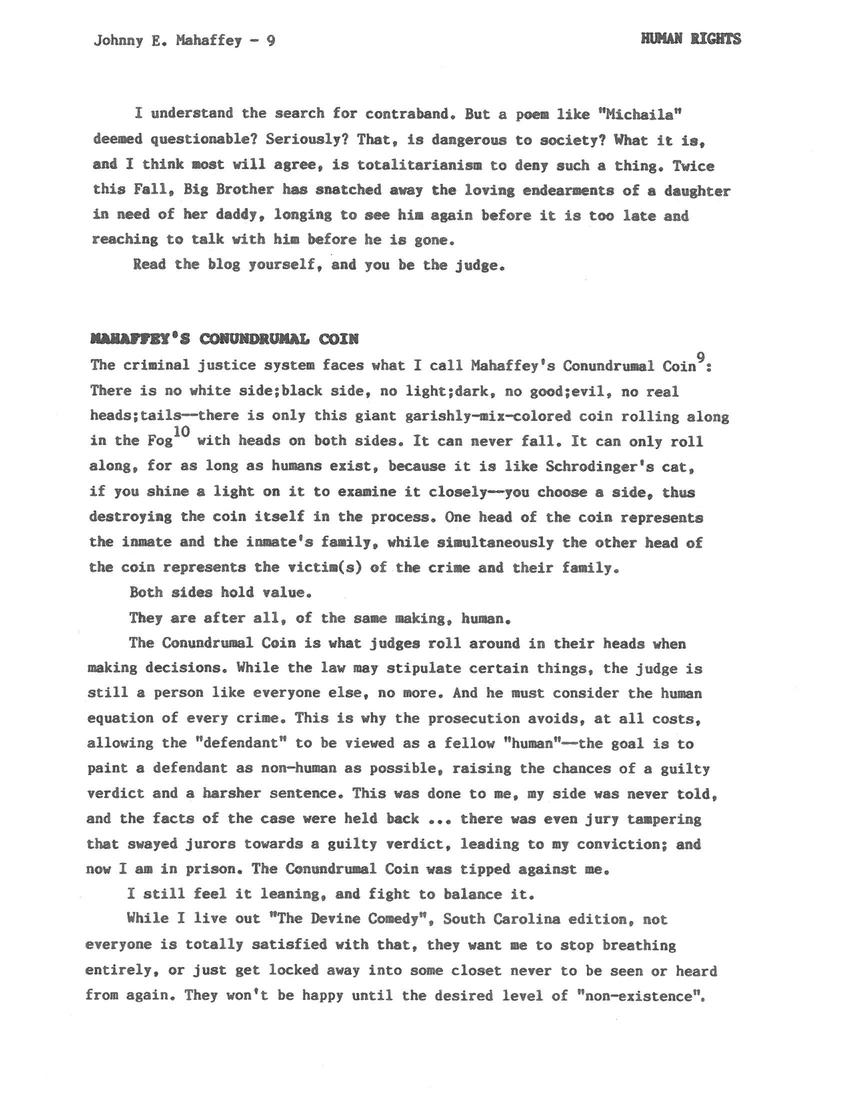
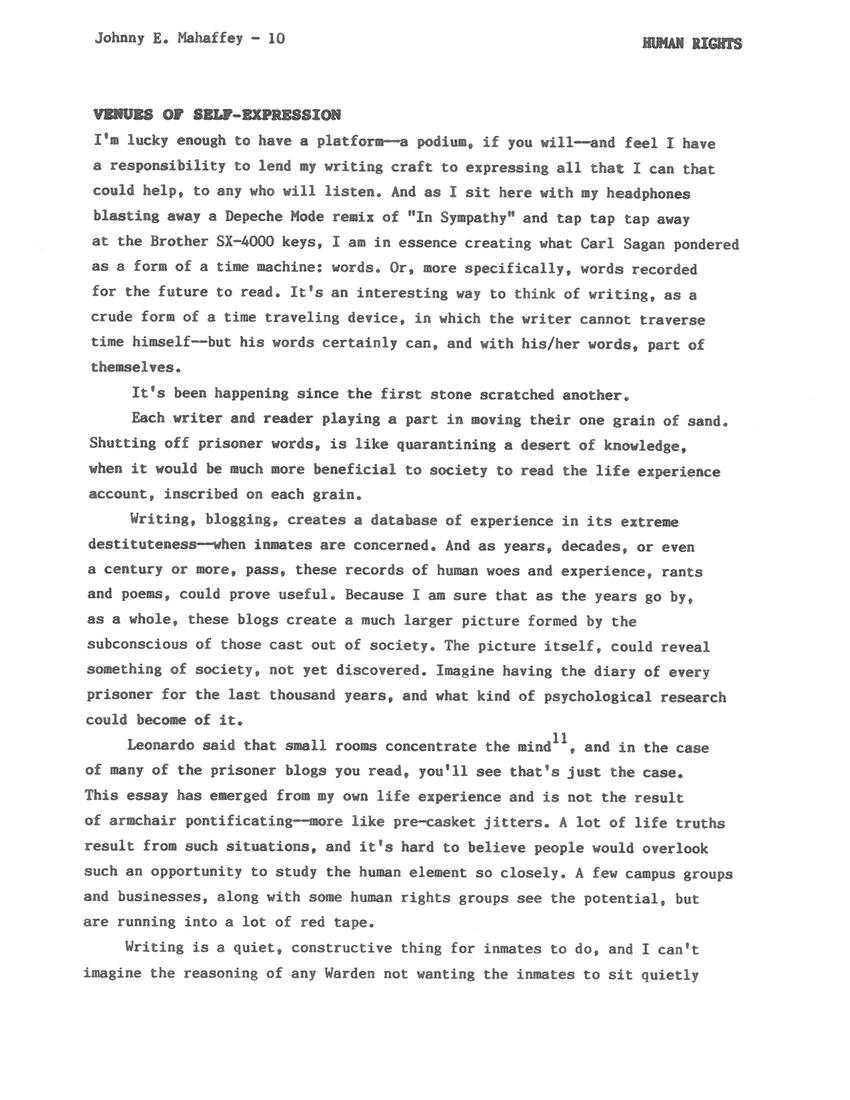
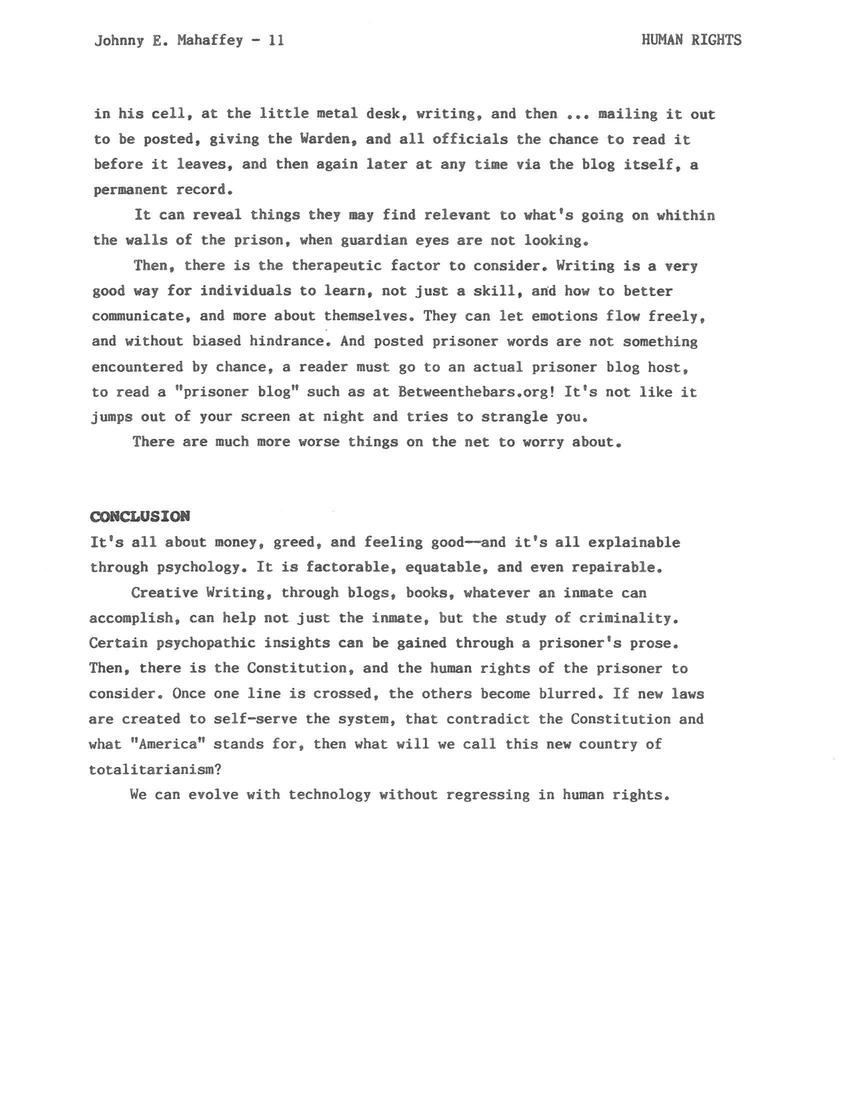
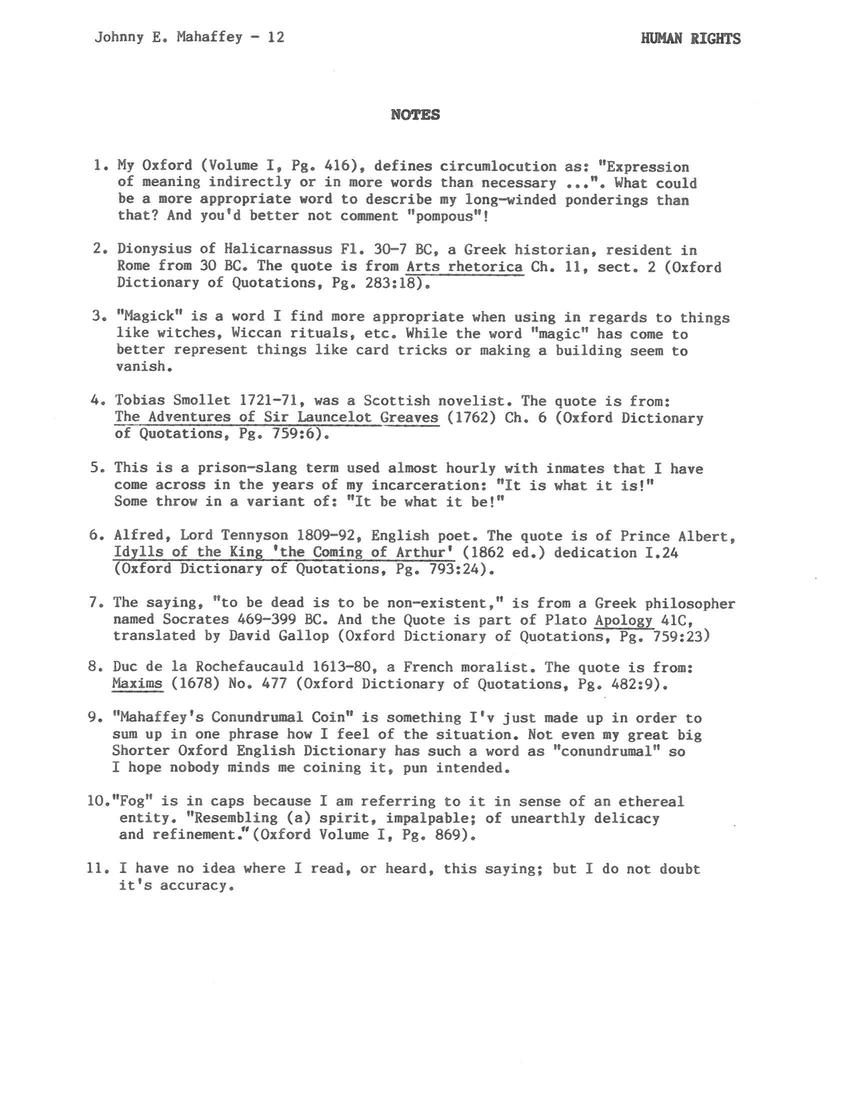
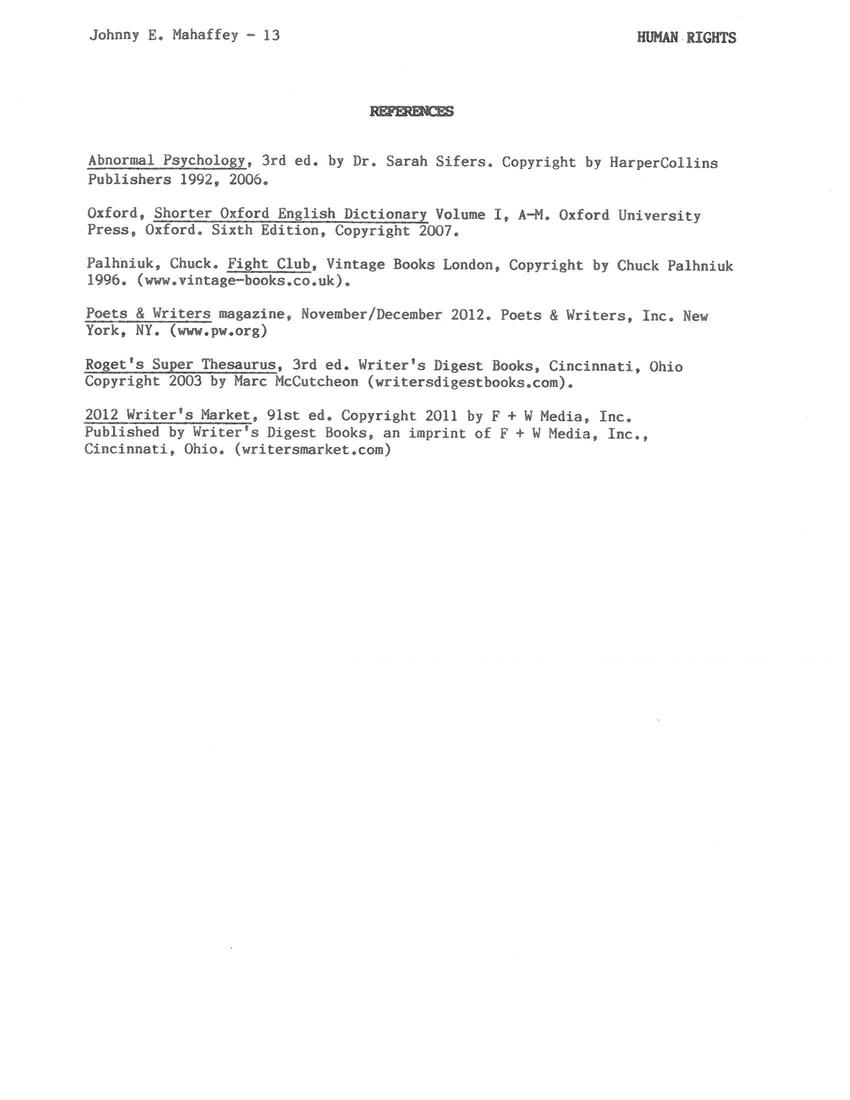

Replies